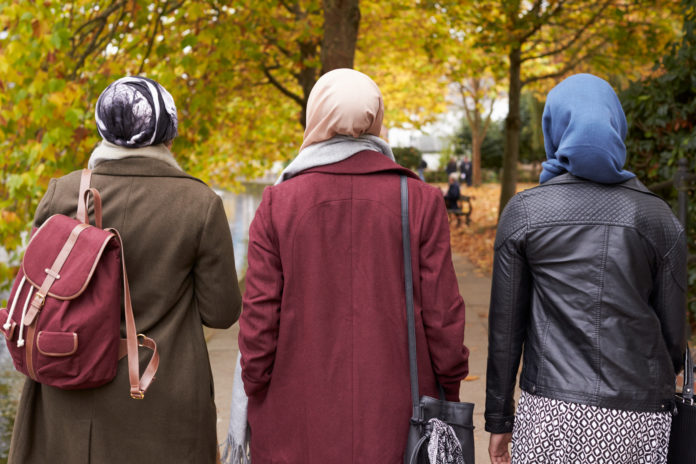A new report has found that the government’s controversial “counter extremism” programme Prevent still relies on religious profiling of Muslims to assign Prevent funding.
A Freedom of Information request submitted by the People’s Review of Prevent revealed that 73% of the UK’s Muslim population live in Prevent Priority Areas (PPAs) which have been kept concealed by the Home Office since 2011.
The report authors are calling on the government to withdraw its Prevent strategy on the grounds that it is ineffective, disproportionate and discriminatory.
And they are calling on practitioners caught up in Prevent (community groups, trades unions and professional associations and civil society groups) to demand that Prevent be withdrawn.
The government says Prevent aims to safeguard vulnerable people from being drawn into terrorism. It insists that Prevent is non-discriminatory and that referrals of “right-wing extremism” have increased.
However, the People’s Review of Prevent found that:
- Prevent takes the signs among young people of ordinary identity development and explorations as indications of “riskiness,” as well as sanctioning their activism.
- Prevent is responsible for the creation in England and Wales of a national curriculum in “fundamental British values” that are determined by national security interests.
- There is no evidence to suggest that there is a problem of integration among British Muslim communities, which are in fact diverse and integrated.
The report was authored by John Holmwood, Professor Emeritus in the School of Sociology and Social Policy at the University of Nottingham, and Dr Layla Aitlhadj, the Director and Senior Caseworker at Prevent Watch where she supports people adversely impacted by the Prevent Duty.
Subscribe to our newsletter and stay updated on the latest news and updates from around the Muslim world!
Prof Holmwood and Dr Aitlhadj said: “Following criticism of the Islamophobic nature of the allocation of funds for PPAs, it became very difficult to get information about what areas are Prevent Priority Areas. Finally, we are pleased to announce that the Home Office has provided us with a list, which is included in our report.
“In addition to the PPAs, Prevent focuses on ‘radicalising locations,’ which include, ‘university campuses and mosques, as well as private/more concealed locations such as homes, cafes, and bookstores.’
“Our report shows that among Prevent’s damaging messages is that Muslims need to assimilate ‘British values,’ which do not value Islamic belief. This narrow conception of ‘British values’ is not only unrealistic, but it alienates Muslims and fuels Islamophobia and discrimination.”
Case studies
The People’s Review of Prevent is an alternative review to the Government William Shawcross-led review, which has been boycotted by many individuals and organisations who say that that critical and impacted voices will not be heard.
The People’s Review features case studies including Ibrahim, a 12-year-old Muslim secondary school child, who was referred to Prevent by his school despite insisting he had articulated his religious view on homosexuality as prohibited.
Ibrahim was later questioned by a Prevent officer on his own, in the absence of his parent and social worker, where he was threatened with a criminal record and loss of educational and job opportunities. The officer also made statements undermining the relevance of the Quran in modern society and warned the child not to say everything that is on his mind.
Ibrahim’s father said: “The counter-terrorism officer made clear we were not welcome in the room during the questioning… My child has been very distressed by the whole experience… he was being treated like a criminal.”
The report also describes the experience of Ilyas, a 15-year-old secondary school boy known by his teachers as being someone who is quite shy.
The pre-pandemic policy of single-gender PE sessions changed once the children returned to school in 2021 and Ilyas questioned this on religious grounds. In a separate instance, he informed another teacher that he wanted to observe the “special prayers.” The school subsequently contacted Ilyas’s mother to arrange a meeting with the school in the presence of a Prevent officer.

Ilyas’s mother was shocked. She said: “How the school made the link between Prevent/terrorism risk to my son is based on his religious belief, and it really demonstrates to me that there has been clear discrimination against my son based on religious grounds.
“It is bad enough that we see links to religious conservatism and terrorism in the media but to think that the schools also believe this is disappointing. They have known my son since Year 7, so it shocks me even more that they could view him in this way.”
The report also says that:
- There is no evidence to suggest a problem of integration of British Muslim communities and no basis for regarding them and their families with suspicion.
- Prevent is discriminatory in the way in which it approaches far-right terrorism differently from that of Islamist terrorism in both the guidance, training and application – the latter as a problem of individuals rather than communities.
- Prevent undermines free expression by defining as “extremist” views and actions which are a normal part of a healthy and functioning democracy.
- Prevent targets actions and behaviours which are not in themselves illegal and for which there is no evidence that they have any relation to future terrorist offences.
- Prevent undermines the proper safeguarding obligations of social workers, teachers and health professionals. It does so by bringing children and young people under an extraordinarily extensive net of surveillance. This includes the creation in England and Wales of a national curriculum in “fundamental British values” determined by national security interests.
- Prevent is an abuse of individual rights to privacy and the protection of data and information held about them, especially in the case of children. Information gathered under Prevent interventions does not involve criminal offences, yet data can be gathered with leading questions, then held and shared as if it involved the most serious offences.
- Prevent is overwhelmingly directed at children and young people where it represents an abuse of their rights and the obligation to put their needs first. There is no national security justification for its policies and practices in education or in other services provided for them.
- Prevent is an abuse of fundamental human rights and protected equalities, especially those preventing discrimination on the grounds of race and ethnicity, and religion. The government proposes that terrorist activities threaten human rights and yet it breaches them in its own Prevent policies and evades scrutiny.
- Prevent “expertise” is being shared with oppressive regimes, including those who terrorise their Muslim populations. and is part of a broader drift towards authoritarianism and efforts to reduce long-established human rights principles.
The full report from the People’s review of Prevent can be found here.


















